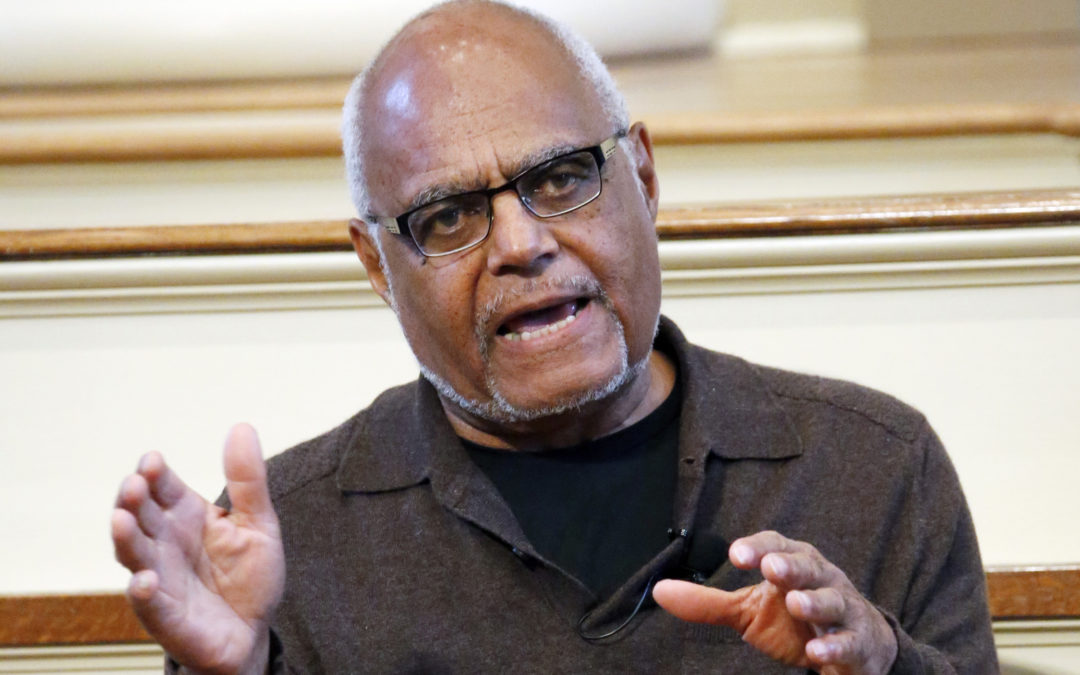
by A. James Rudin, RNS | Jul 30, 2021 | Black History, Commentary, Headline News |
(RNS) — The death of Bob Moses on Sunday (July 25) at age 86 should make anyone who dares meddle with Americans’ voting rights in this country pause. The life of the great educator and civil rights leader in Mississippi during the turbulent and violent 1960s reminds us that there may be no more noble cause and that it attracts powerful champions.
I met the 29-year-old Moses at the Morning Star Baptist Church in Hattiesburg, Mississippi, in February 1964, when I was a young rabbi serving Congregation B’Nai Jehudah in Kansas City, Missouri. Like millions of Americans, I had been deeply moved months before by the huge civil rights rally that drew hundreds of thousands of people to the Lincoln Memorial.
In February 1964, the Rabbinical Association of Greater Kansas City sent me to Hattiesburg as its official representative to participate in the interreligious Ministers’ Project, which included rabbis, Presbyterian pastors and Episcopal priests from all over the country. I spent a week in Mississippi supporting the town’s African Americans, who were cynically forced to take a detailed and lengthy test that only a constitutional scholar could pass, designed to systematically deprive them of their vote.
When the Hattiesburg voting rights drive began in January, only 12 out of 7,000 eligible Black voters were registered. By early April, the number had climbed to nearly 800.
The drive, based upon non-violent direct action, consisted of marching each morning for several hours with other clergy in front of the Forrest County Courthouse demanding an end to voter suppression. In the afternoons, we went from house to house, instructing Black residents on how to register despite the onerous restrictions that were placed on them. In the evenings, the rabbis and Christian clergy attended various Black churches where we heard stirring music, powerful sermons and again we offered assistance in voter registration.
On one of those nights, at Morning Star Baptist, Bob Moses got up to speak. A graduate of Hamilton College in Clinton, New York, he had earned a master’s degree in philosophy at Harvard University, but, stirred by the civil rights movement, he had left his safe teaching position at Horace Mann, an elite private school in New York City, and traveled to Mississippi in 1960.
Moses soon became a prominent figure as the field secretary in the newly established voter registration group, the Student Non-Violent Coordinating Committee, popularly known as “Snick.”
By February of 1964, he had become a legend. He had been shot at as he rode in a car. He had been knifed in the head by a violent segregationist, and, because no white doctor would treat his wound, Moses had to be driven around until a Black physician was finally located and sewed nine stitches in his head.
Moses delivered a powerful, eloquent address that night at Morning Star. He had a professorial mien and communicated in a soft voice but spoke in powerful cadences about the fundamental American right to vote. Fifty-seven years later, the memory of Moses’ magnificent oration has the power to stir me.
The next year, Moses organized the 1964 Mississippi Freedom Summer Project that attracted many young volunteers, including two young Jewish men from New York City: Andrew Goodman and Michael Schwerner, who heeded Moses’ call to assist in registering Black voters.
That summer, Goodman and Schwerner were murdered in Neshoba County, Mississippi, by members of the Ku Klux Klan, along with James Chaney, a young Black civil rights worker. Their killers were only brought to justice many years later.
Moses believed that a quality education was another necessity if we were to achieve a just and equitable society. In the 1980s, Moses organized “The Algebra Project,” whose goal was to help young Black students acquire skill in mathematics, a subject Moses discovered was greatly lacking for many African-American students.
When I returned to Kansas City, I wrote an article that appeared in the “Jewish Frontier,” a national magazine, about my Mississippi experiences. I concluded the piece with two predictions: There would be violence in Mississippi during the summer of 1964, and “total integration” would come to the United States within 10 years.
I was tragically correct about the potential for violence and much too optimistic about the end of racism in the United States. In those days, listening to men like Moses, it was possible to believe it.
May his memory and legacy always be an inspiration and a challenge for all Americans.
(Rabbi A. James Rudin is the American Jewish Committee’s senior interreligious adviser and the author of “Pillar of Fire: A Biography of Rabbi Stephen S. Wise.” He can be reached atjamesrudin.com. The views expressed in this commentary do not necessarily reflect those of Religion News Service.)

by David Crary, AP National Writer | Jul 27, 2021 | Commentary, Headline News |

Felicity Brown, 9, uses a workbook to practice math with her parents and siblings at home in Austin, Texas, on Tuesday, July 13, 2021. After homeschooling during the pandemic, the Brown family has switched to homeschooling their kids permanently using a Catholic-based curriculum and won’t be sending them back to in-person schools in the fall. (AP Photo/Eric Gay)
Although the pandemic disrupted family life across the U.S. since taking hold in spring 2020, some parents are grateful for one consequence: They’re now opting to homeschool their children, even as schools plan to resume in-person classes.
The specific reasons vary widely. Some families who spoke with The Associated Press have children with special educational needs; others seek a faith-based curriculum or say their local schools are flawed. The common denominator: They tried homeschooling on what they thought was a temporary basis and found it beneficial to their children.
“That’s one of the silver linings of the pandemic — I don’t think we would have chosen to homeschool otherwise,” said Danielle King of Randolph, Vermont, whose 7-year-old daughter Zoë thrived with the flexible, one-on-one instruction. Her curriculum has included literature, anatomy, even archaeology, enlivened by outdoor excursions to search for fossils.
The surge has been confirmed by the U.S. Census Bureau, which reported in March that the rate of households homeschooling their children rose to 11% by September 2020, more than doubling from 5.4% just six months earlier.
Black households saw the largest jump; their homeschooling rate rose from 3.3% in the spring of 2020 to 16.1% in the fall.
The parents in one of those households, Arlena and Robert Brown of Austin, Texas, had three children in elementary school when the pandemic took hold. After experimenting with virtual learning, the couple opted to try homeschooling with a Catholic-oriented curriculum provided by Seton Home Study School, which serves about 16,000 students nationwide.
The Browns plan to continue homeschooling for the coming year, grateful that they can tailor the curriculum to fit their children’s distinctive needs. Jacoby, 11, has been diagnosed with narcolepsy and sometimes needs naps during the day; Riley, 10, has tested as academically gifted; Felicity, 9, has a learning disability.
“I didn’t want my kids to become a statistic and not meet their full potential,” said Robert Brown, a former teacher who now does consulting. “And we wanted them to have very solid understanding of their faith.”
Arlena Brown, who gave birth to a fourth child 10 months ago, worked as a preschool teacher before the pandemic. Homeschooling, she says, has been a rewarding adventure.
“In the beginning, the biggest challenge was to unschool ourselves and understand that homeschooling has so much freedom,” she said. “We can go as quickly or slowly as we need to.”
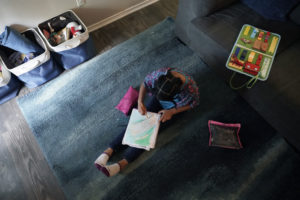
Felicity Brown, 9, draws as she takes a break from math practice at her home in Austin, Texas, Tuesday, July 13, 2021. After homeschooling during the pandemic, the Brown family have switched to homeschooling their kids permanently using a Catholic-based curriculum and won’t be sending them back to in-person schools this fall. (AP Photo/Eric Gay)
Race played a key role in the decision by another African American family to homeschool their 12-year-old son, Dorian.
Angela Valentine said Dorian was often the only Black student in his classes at a suburban Chicago public school, was sometimes treated unfairly by administrators, and was dismayed as other children stopped playing with him.
As the pandemic eased, the family decided to keep Dorian at home and teach him there, using a curriculum provided by National Black Home Educators that provides content for each academic subject pertaining to African American history and culture.
“I felt the burden of making the shift, making sure we’re making the right choices,” Valentine said. “But until we’re really comfortable with his learning environment, we’ll stay on this homeschool journey.”
Charmaine Williams, who lives in the St. Louis suburb of Baldwin, also is using the National Black Home Educators curriculum as she homeschools her 10-year-old son, Justin, and 6-year-old daughter, Janel.
Williams said she and her husband tried two previous stints of homeschooling for Justin after school officials complained about his behavior. Now — with the new curriculum and an accompanying support network — they feel more confident about choosing it as a long-term option.
“At school, children have to follow a certain pattern, and there’s bullying, belittling — compared to being home where they’re free to be themselves,” Williams said.
“There’s no turning back for us now,” she added. “The pandemic has been a blessing — an opportunity to take ownership of our children’s education.”
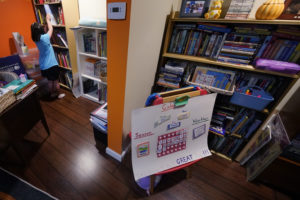
Lily Osgood, 7, selects a book to read from the family library of nearly 2,000 books she shares with her brother, Noah, Tuesday, July 20, 2021, in Fairfax, Vt. The Osgood children will continue to be homeschool this upcoming school year. As the pandemic took hold across the United States in the spring of 2020, it brought disruption and anxiety to most families. Yet some parents are grateful for one consequence: they are now opting to homeschool their children even as schools plan to resume in-person classes. (AP Photo/Charles Krupa)
Joyce Burges, co-founder and program director of National Black Home Educators, said the 21-year-old organization had about 5,000 members before the pandemic and now has more than 35,000.
Many of the new families experienced difficulties, including lack of internet access, that limited their children’s ability to benefit from virtual learning during the pandemic, Burges said.
“It got so they didn’t trust anything but their own homes, and their children being with them,” she said. “Now they’re seeing the future — seeing what their children can do.”
For some families, the switch to homeschooling was influenced by their children’s special needs. That’s the case for Jennifer Osgood of Fairfax, Vermont, whose 7-year-old daughter Lily has Down syndrome.
Having observed Lily’s progress with reading and arithmetic while at home during the pandemic, Osgood is convinced homeschooling is the best option for her going forward.
She has made the same decision for her 12-year-old son Noah, who didn’t like the remote classes offered by his public school in the spring of 2020, and did homeschooling throughout the 2020-21 school year. It went so well that they want to continue for at least a few more years.
“He told me he was learning so much more at home than he ever did in school,” Osgood recalled. “He said, ‘School is just so chaotic — we don’t get very much done in any particular class. Here, I sit down, you tell me what to do, and minutes later I’m done.'”
Heather Pray of Phoenix, Maryland, says homeschooling has been a major success for her 7-year-old son, Jackson, who has autism. The family made the switch because Jackson was struggling with the virtual learning that his school provided during the pandemic.
“My son did great (with homeschooling), even with just two hours of schoolwork a day,” Pray said. “I got him into piano lessons, taught him to read.”
Pray is also homeschooling her daughter, Hayley, who’s going into 7th grade and had been attending a Christian school.
“I had no idea how this was going to go — I just dove in headfirst,” said Pray. “I felt God was holding my hand.”
The Gonzalez family from Appomattox, Virginia — who are devout Catholics — opted to homeschool their three sons, ages 9, 13 and 15, after their Catholic school in Lynchburg closed in 2020 due to falling enrollment.
They’re using the Catholic-focused curriculum from Seton Home Study School, which Jennifer Gonzalez, the boys’ mom, described as rigorous but well-organized.
“My kids have just excelled,” she said. “We’re able to be home and be together.”
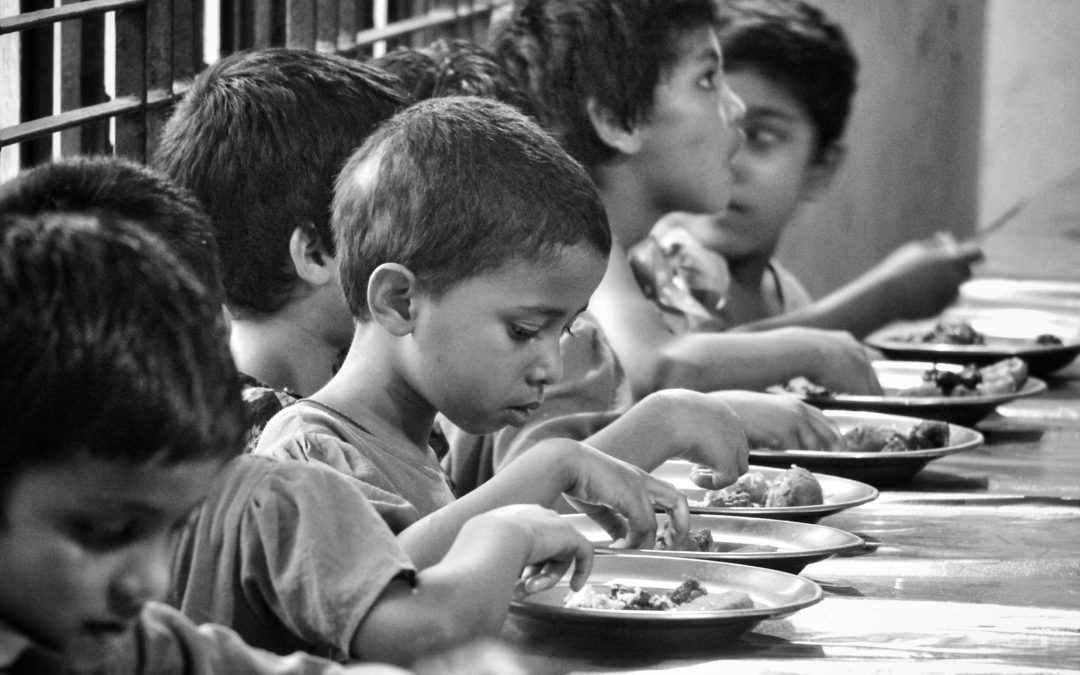
by Emily McFarlan Miller, RNS | Jul 23, 2021 | Headline News |
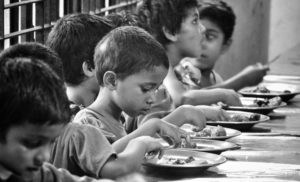
(RNS) — More than a million children around the world may have been orphaned by COVID-19, losing one or both parents to the disease or related causes.
Another estimated 500,000 lost a grandparent or another relative who cared for them.
The numbers are from a new study by researchers from the U.S. Centers for Disease Control and Prevention and others that highlight another grim reality in the sweeping devastation caused by the ongoing pandemic.
“These new estimates highlight the tremendous impact COVID-19 has had on children around the world,” said Elli Oswald, executive director of the Faith to Action Initiative.
Members of the Faith to Action Initiative, a coalition of faith-based child welfare organizations that includes Bethany Christian Services, World Vision and other nonprofits and ministries, responded this week to the study published Tuesday (July 20) in The Lancet, encouraging Christians to mobilize to care for those children and support surviving family members.
“We know when families are supported during these tragic times, they can provide the love and care a child needs to thrive. The church is best placed to respond to the needs of these children as it carries out the vision we see in scripture of God’s intention for family, and ensures that a child never needs to be placed in an orphanage,” Oswald said.
Researchers from the CDC, the U.S. Agency for International Development, the World Bank and the University College London used COVID-19 mortality data from March 2020 through April 2021 and national fertility statistics for 21 countries to offer the first global estimates of the number of children orphaned by the disease.
Their methods were similar to those used by the UNAIDS Reference Group on Estimates, Modelling and Projections to estimate the number of children orphaned by AIDS.
“Orphanhood and caregiver deaths are a hidden pandemic resulting from COVID-19-associated deaths,” according to the study.
Children who have lost a parent or caregiver are at increased risk for disease, physical abuse, sexual violence and adolescent pregnancy, according to a press release accompanying the study. They also risk being separated from their families and placed in orphanages or care homes, which researchers say have been linked to negative effects on social, physical and mental development.
The solution, said Chris Palusky, president and CEO of Bethany Christian Services, is “the loving care of a family, not another orphanage.” He pointed to Scripture passages that say God sets the lonely in families and call on Christians to care for those who have been orphaned.
“We urge Christians to support efforts to strengthen vulnerable families and communities, reunify families, and place children without caregivers in loving families, so that children never have to live in orphanages,” Palusky said.
Losing a loved one and caring for orphaned children also puts “immense” stress on remaining parents and extended family members, added Margaret Schuler, World Vision’s senior vice president of international programs.
“Yet efforts for care must be focused at supporting them in and through their families to prevent unnecessary separation,” Schuler said. “We encourage Christians and the Church to mobilize to keep families together in order to help children thrive.”
The study was published alongside a report by the CDC and other agencies titled ” Children: The Hidden Pandemic 2021.”
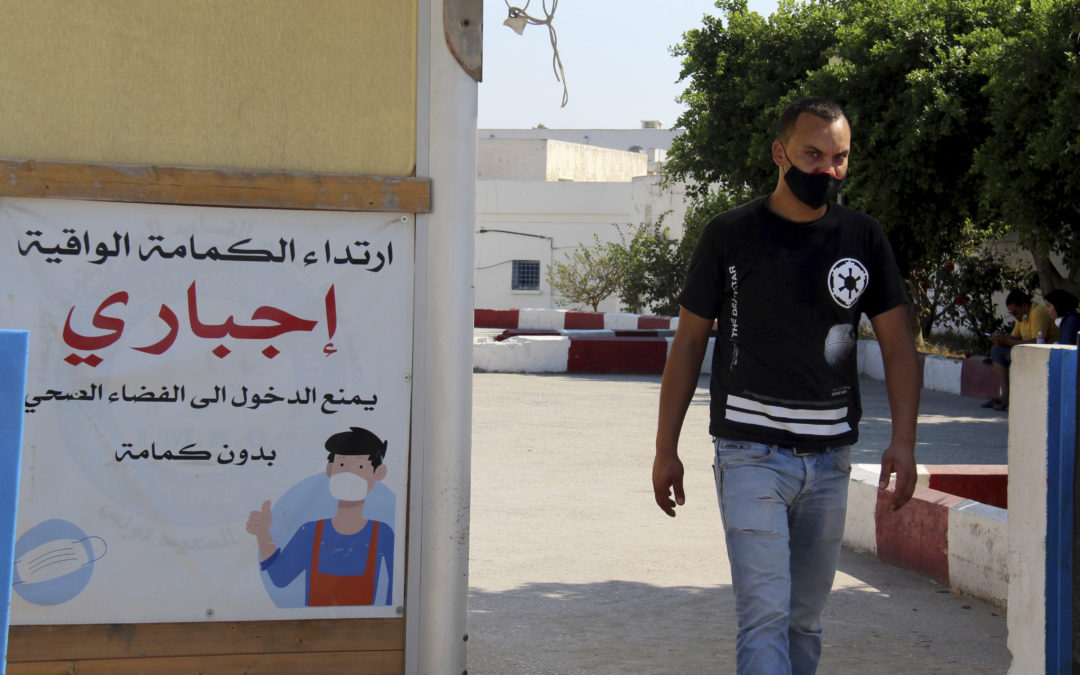
by Bouazza Ben Bouazza, Associated Press | Jul 22, 2021 | Headline News |
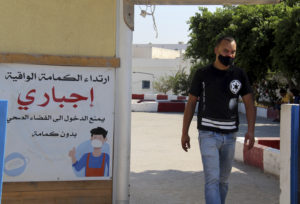
A man wearing a face mask to protect from COVID-19 leaves a hospital in Tunis, Tunisia, Wednesday, July 21, 2021. Tunisia’s president on Wednesday ordered the military to take over management of the national COVID-19 pandemic response, as the country fights one of Africa’s worst outbreaks. (AP Photo/Hassene Dridi)
TUNIS, Tunisia (AP) — Tunisia’s president ordered the military Wednesday to take over managing the national COVID-19 pandemic response, as the country fights one of Africa’s worst outbreaks.
The military health service will be assigned the task, Tunisian President Kais Saied announced on regional TV network Al Arabiya.
Soldiers and military medics are already carrying out vaccinations in remote parts of Tunisia. On Tuesday, military trucks transported oxygen to regions in the center and northwest of the country where hospitals are suffering shortages.
Meanwhile, an interim health minister on Wednesday replaced the health minister who was fired over his surprise decision to open vaccination centers to all adults for the first time this week during the Muslim holiday Eid al-Adha.
Authorities were unprepared for the decision, which prompted confusion and chaos as crowds massed at vaccination centers. The president called it a “crime” to encourage large groups to gather while the government is trying to limit the spread of the virus.
Eid al-Adha, or the “Feast of Sacrifice,” is typically marked by communal prayers, large social gatherings, slaughtering of livestock and distributing meat to the needy. This year, Tunisian authorities restricted gatherings and reinstated a curfew in some regions with high numbers of confirmed cases.
In a new blow to Tunisia’s long-struggling tourism sector, authorities closed some of the country’s Mediterranean beaches.
The former health minister’s decision to open vaccination centers during the holiday led to confrontations at some locations between people seeking shots before doses ran out and health officials trying to enforce anti-infection measures.
Windows and doors of some vaccination centers were smashed, and medics and paramedics were assaulted in some places, oOpposition lawmaker Saifeddine Merghni, a medical doctor, said.
“The least that can be said is that the decision (to open vaccination centers on the Muslim feast day) is wrong, and you see its repercussions,” he said. “The day of joy (Eid Al-Adha) turned into a day of a lot of tension.”
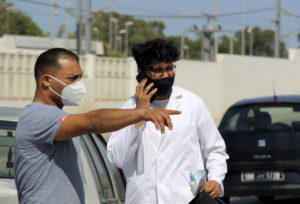
People wearing face masks to protect from COVID-19, stand outside a hospital in Tunis, Tunisia, Wednesday, July 21, 2021. Tunisia’s president on Wednesday ordered the military to take over management of the national COVID-19 pandemic response, as the country fights one of Africa’s worst outbreaks. (AP Photo/Hassene Dridi)
The line at the only vaccination center in the central city of Kairouan was so long that 63-year-old Ali ben Haj was making his third try to get vaccinated and growing impatient.
“Look at all the people. Why all this? What have we done? You, authorities, if you cannot find solutions for us, let us search for solutions ourselves,” he said.
Overall, Tunisia has reported more deaths per capita than any African country and among the highest daily death rates per capita in the world in recent weeks. Foreign countries have been pouring in vaccines and other medical aid.
___
Mehdi El Arem contributed from Kairouan and Tunis.
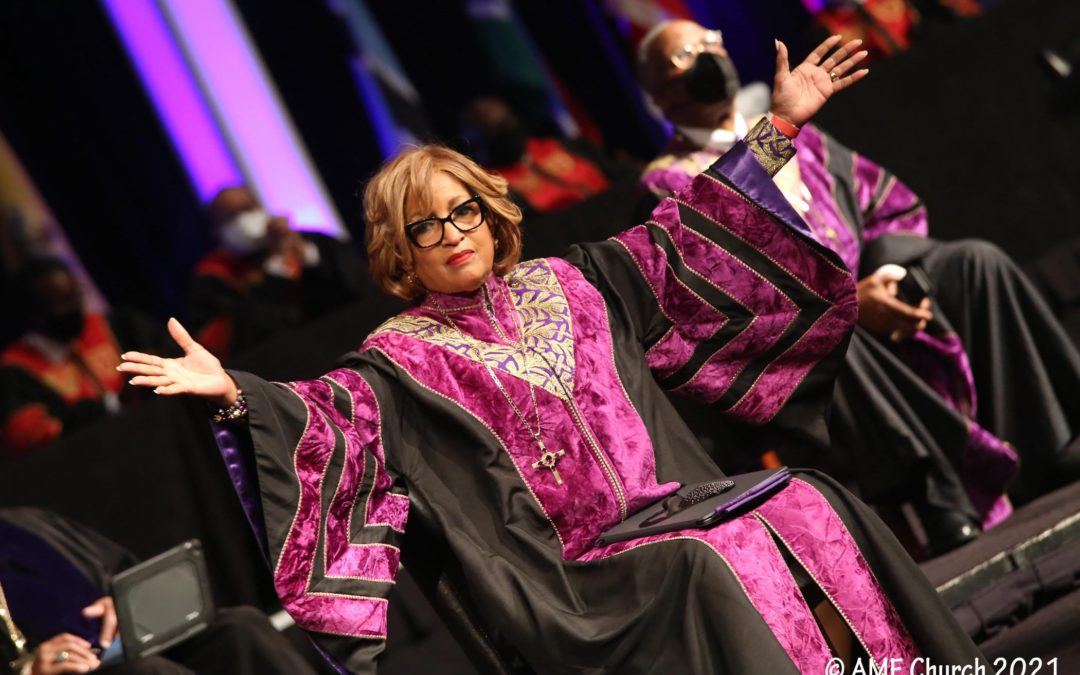
by Adelle M. Banks, RNS | Jul 21, 2021 | Black History, Commentary, Headline News |
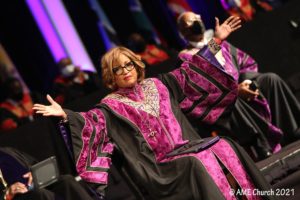
(RNS) — Just-retired Bishop Vashti Murphy McKenzie is an apologist for an adaptive style of leadership. It’s what has helped her succeed as the first woman to hold many roles in the African Methodist Episcopal Church. And it’s a style of leadership she said was needed during the pandemic.
“Adaptive leadership means that you are faced with situations but do not have a solution or answer that comes from past experiences, so you have to adapt,” she said in an interview on Thursday (July 15), a week after her retirement began at the close of her denomination’s General Conference in Orlando, Florida.
“You have to know how to pivot, you have to step back, get on the balcony, survey the scene, throw out what you know or what you think you know and then find the answer that’s going to fit this issue right here.”
McKenzie, who remains the national chaplain of the Delta Sigma Theta sorority, acknowledged this approach appeals to her because that’s the way she’s lived her life as a female trailblazer in her 205-year-old denomination. In 2000, McKenzie was the first woman elected bishop and later the first to serve as president of its Council of Bishops and chair of the General Conference Commission, which organizes the denomination’s quadrennial meeting.
Now one of five women bishops elected in the AME Church, McKenzie remains ready to answer anyone who questions their ability to lead.
“Do I think women can do this? Yes,” she said. “Do I think women are called to this? Yes. Do I think the women that have been elected in my denomination have done an exceptional job? Absolutely.”
As she led AME regional districts in Africa, Tennessee and Texas, McKenzie said she focused on her work rather than her title, letting the results speak for themselves. She modeled holding babies with AIDS to show it was safe and proved it was worthwhile to develop church websites to help attract new members and it was practical to use golf tournaments as fundraisers for church projects and seminary scholarships.
As she spoke at the conclusion of the General Conference bishops’ retirement service on July 9, she thanked her husband, former NBA guard Stan McKenzie (the first male episcopal supervisor of missionary work in the AME Church), her denomination and God for their support.
“What God did for me is evidence of what God can do for you,” she said. “For if God could do this, God can do what God promises you. That can be done no matter who says it can’t be.”
McKenzie, 74, talked with Religion News Service about her journey as a female bishop, those who paved the way for her to reach that role, and what’s next for her and for her denomination.
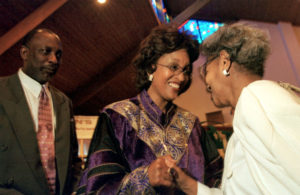
Bishop Vashti Murphy McKenzie, center, outgoing pastor of Payne Memorial African Methodist Episcopal Church in Baltimore, bids longtime member Helen Thorton farewell on her last Sunday at the church in Sept. 2000. At left is her husband, Stan McKenzie. Photo by Carl Bower
The interview has been edited for length and clarity.
Looking back as the first woman bishop of the African Methodist Episcopal Church, is there a way you would sum up your experience since 2000?
Being the first of anything, there is no book. There is no DVD. There’s no movie. There’s nobody in front of you, to be able to share back experiences of what it’s going to look like and feel like and be like and so you’re charting your own way. And as people receive you — not only as you are in your position but also receive you as a human being — and begin to see you have something to bring to the table and be able to embrace the uniqueness of my femininity. I do what bishops have to do, but I don’t do them in the same way because I’m Vashti.
Your family has long been in the journalism business, running the Afro American newspaper chain. You wrote newspaper articles starting at age 16 and as bishop you oversaw denominational publications including The Christian Recorder. What was it like to move from being in the news business to becoming a newsmaker?
It was a little bit different being on the other side of the microphone, the other side of the camera and on the other side of the notepad, really, because I grew up telling some other people’s stories. And then the shift comes where then you become the story. And so, my intention was not to have my episcopal career be about me. That my episcopal career would be about the people I serve. So I was intentional, to focus on the work, rather than the first. God didn’t just call me to be first. God called me to do the work. And so that’s what I focused on in each of the districts I served.
You mentioned in the “Echoes from the General Conference” documentary that, though 2000 was a turning point for women bishops, it was preceded by earlier actions. What and/or who paved the way?
Well, many, many women. Many women whose names were not written, who did not get a footnote, who were in the margins. Faces and names people have forgotten a long time ago. Beginning with Jarena Lee. Jarena Lee stood at her time, when Bishop Richard Allen says he’s not going to license women. But God created an opportunity and she stood, and so then off she goes to walking and preaching hundreds of miles.
Elizabeth Scott ran for the episcopacy for many, many, many years. The women who were appointed presiding elders, the women who were appointed pastors, and did fabulous work because if they didn’t, then they would never give another woman a chance.
The 2021 episcopal address, the message of the bishops to the denomination during the General Conference, spoke of longtime struggles for women to gain ordination, and the rank of bishop. What action do you think is needed still?
What seems to be difficult for the church at large — and I’m talking about the universal church, denominations at large — is the inability of embracing inclusivity, as far as women is concerned. Just because you’re at the table, doesn’t mean it’s success for all women. Just because there’s one presiding elder, one woman who is a bishop, doesn’t mean the playing field is level for all women. And so in order for that to happen, we have to be intentional, and intentional means you don’t promote or assign just because a woman is a woman. You recognize her gifts. When I ran, I didn’t run on a platform saying elect me because I’m a woman. I ran on a platform that says elect me because I’m qualified.
Was there something you’re particularly proud of achieving in ecumenical or interfaith circles?
Most of my ministry is focused within the AME Church but I preach everywhere. I have preached for the Presbyterian women, the Baptist women. I preached for the Hampton (University) Ministers’ Conference with denominations from all over, for the United Methodist Church, for the United Methodist annual conferences. And in that way, sharing prophetically also helps to shape people’s embracing women. I have preached at Catholic churches. I have spoken in Jewish communities.
I have preached in seminaries, and it’s so important for the female seminarians to be able to see someone who is their same gender, who has the same kind of uniqueness, as an encouragement to see the broader picture, to see ministry beyond your own front door.
The AME Church has voted to start an ad hoc committee on LGBTQ matters. Do you think it may be turning a corner about acceptance of LGBTQ people, just as the denomination turned a corner on women bishops 21 years ago?
I think dialogue is going to be good for the church because there are different people in different places having different kinds of conversations and to be able to have open conversation, which an ad hoc committee would provide, where the church is gathered, will be healthy and may be helpful.
Do you see an end to the ban on same-sex marriage?
I think we’re going to have to wait and see the conversation, the power of the conversation. I just think it’s just too hard to predict at this moment. We have to remember the church, the broader church, has a hard time dealing with racism. Church, period, had a hard time dealing with sexism. They have a hard time dealing with agism, classism. And now, this is the next wrestle. And after this wrestle, there’ll be another, and there’ll be another, and there’ll be another, and there’ll be another.
So now that you have reached retirement as an AME bishop, what’s next for you?
I’m going to continue with Selah (Leadership Encounters for Women, her professional women’s empowerment organization) because I have a passion for leadership. I plan to write. This is a good time to sit down and put some thoughts down on paper. And then, as they say, we’ll look into the horizon to see what also is next.
This story has been corrected to clarify that the African Methodist Episcopal Church has a ban on same-sex marriage. It does not have a ban on ordination of LGBTQ persons.













